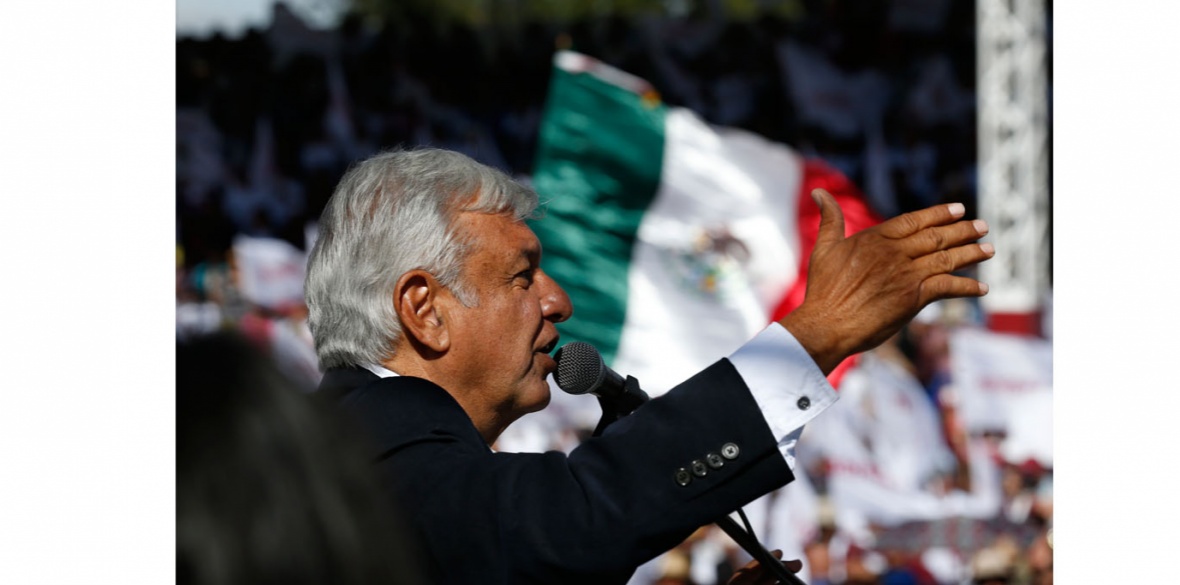This is the last article you can read this month
You can read more article this month
You can read more articles this month
Sorry your limit is up for this month
Reset on:
Please help support the Morning Star by subscribing here
WITH Mexico’s elections coming to a close on July 1, left-wing presidential candidate Andres Manuel Lopez Obrador — popularly known as Amlo — is the favoured candidate by a wide margin.
A recent poll by the Mexican daily newspaper Reforma says Amlo, who is running for the centre-left National Regeneration Movement (Morena) and its coalition partner the Workers’ Party, is supported by 52 per cent of voters and is at least 20 per cent ahead of his two rival candidates on the right.
The coalition is seeking to change the capitalist neoliberal model, imposed on the country in the 1980s by the Institutional Revolutionary Party (PRI), which has destroyed the country’s industrial base and agriculture and benefited a minority while impoverishing the majority.
The coalition proposes to rebuild the economy through a state-led economic development scheme, assist domestic industry, help farmers foster greater food production and implement a wide range of social programmes to eliminate poverty and reduce crime, such as increasing wages for private and public-sector workers, introducing a jobs training programme for the country’s unemployed youth, doubling state pensions for all seniors and implementing free public healthcare.
Amlo contends that his rivals in the National Action Party (Pan) and outgoing President Enrique Pena Nieto’s PRI have created a “mafia state” that “concentrates economic and political power in Mexico” in the hands of a minority instead of the majority.
This is Amlo’s third run for president. He ran for the Democratic Revolution Party (PRD) in 2006 and 2012 but was denied the presidency through electoral fraud. Amlo left the PRD later in 2012 because of its right-wing drift and helped form Morena.
The two leading candidates running for president on the right are Ricardo Anaya, representing Pan and its coalition partners PRD, and Jose Antonio Meade, representing the PRI and its Green Party ally.
Both Anaya and Meade propose a continuation of the country’s neoliberal capitalist model. They are trying to blunt Amlo’s lead in the polls by smearing him as a left-wing populist who will turn Mexico into another Venezuela, where people are allegedly dying from shortages of food and medicine.
The country’s mainstream corporate media has also emphasised the same theme that, if Amlo is elected president, then Mexico will face the same economic disasters as Venezuela and Cuba.
However, while both Anaya and Meade continue to paint Amlo as something of a potential left-wing despot, they both propose greater spending on social welfare programmes to combat poverty.
At the same time, there has been a split on the right as both PRI and Pan try and catch up to Amlo. Meade recently called Anaya a “vulgar thief who when in power robbed money [from the state].”
He has called on the attorney general to investigate Anaya for allegedly accepting bribes to arrange illegal business deals from businessmen while he was a Pan senator. Anaya is also currently facing money-laundering charges in Spain and Mexico.
The current presidential elections also include those for Congress and Senate.
Many are afraid that the PRI, which currently governs the country, will again rig the elections to prevent Amlo from winning as it has done in the past.
While some analysts have suggested that Amlo’s lead in the polls is so great that it would be difficult to rig the elections this time, evidence is already emerging that the PRI and Pan may be preparing to commit fraud at the polls.
A recent media report alleges that the company which will be transporting the ballots from the voting booths on election day is owned by former Pan president Vicente Fox, who governed the country from 2000 to 2006.
INE, the organisation in charge of monitoring the elections, confirms that a Fox-controlled company will be transporting the ballots but insists soldiers will be guarding the lorries carrying the election material.
Critics are crying foul because INE will be providing non-erasable pencils instead of pens at voting booths for voters to mark their paper ballots.
The INE pencils were tested in Mexico city and the state of Michoacan to see if a voters preference on a ballot could be erased and then changed.
While the “X” on a ballot could not be erased in Mexico City, it could be in Michoacan.
Already, state PRI and Pan governments across the country have been caught distributing food, public money and goods among the poor in exchange for votes for both parties.
At the previous election, the PRI employed a massive vote-buying scheme at the local level that led to victory at the polls.
A June 15 report in the Reforma newspaper alleged that busloads of people have been arriving at PRI headquarters in Mexico City and paid 1,500 pesos (£55) for photocopies of their voter credential cards.
There have also been reports on social media by people claiming to have taken part in this scheme complaining that the PRI only paid them 500 pesos (£18) and in some cases with counterfeit bills.
Amlo has said that his coalition will have representatives at all voting centres to ensure that ballots are counted honestly, which allegedly did not happen in previous elections.












